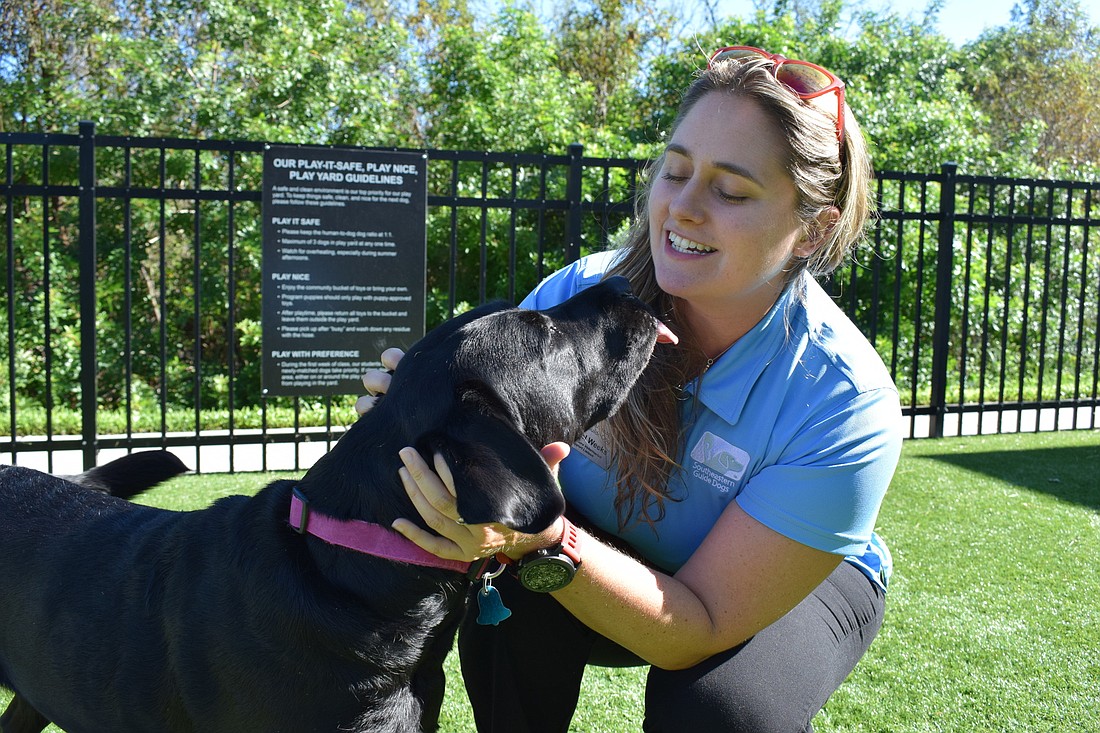- November 15, 2024
-
-
Loading

Loading

Call it a Plum assignment.
Greenbrook's Rachel Weeks, who has lost most of her hearing and sight due to Usher syndrome, accepted a job in August at Southeastern Guide Dogs.
Every day she shows up for her new position, the 4-year-old Plum is by her side. Plum has been Weeks' guide dog the past 2 1/2 years.
They work as a team, even though Plum appears to have the best of that particular deal. When Weeks is sitting in her new office working, her English Labrador lays on a dog bed on the floor behind her, mostly sleeping.
'If you know labs, you know they love to sleep," Weeks said.
Plum doesn't get to dictate too much to Weeks while they are on the job, except for one thing.
"Her breaks are my breaks," Weeks said with a laugh.
Southeastern Guide Dogs is a dog-friendly environment for its employees and it has a large exercise area for dogs to stretch and relieve themselves.
The two actually met at Southeastern Guide Dogs as Weeks had to go through the usual three-week, intense program every recipient of a guide dog must complete. The recipients must live on Southeastern Guide Dogs' 33-acre, Palmetto campus for six days of each of those three weeks. Weeks had tested with six service dogs before being matched with Plum.
"Plum is very laid back," said Weeks, who explained that is important because she travels extensively. "Our personalities fit well."
Weeks was impressed with the care taken to pair the two, as well as how smoothly their transition went due to Plum's training. She said it costs "tens of thousands of dollars and a two-year process" for Southeastern Guide Dogs to train each dog.
Since their pairing in 2016, she has been so passionate about their union she has been asked to speak at "graduation" ceremonies celebrating the pairings of other guide dogs with their new owners.
Those speaking opportunities caught the attention of Southeastern Guide Dogs CEO Titus Herman.
Working as a rehabilitation counselor in the Division of Blind Services for the Florida Department of Education, Weeks was approached by Herman after one of the graduation events.
"He said, 'What would you think about coming to work for us?"
She loved the idea of working with her peers and getting a raise from her now former job.
"Oh my gosh," Weeks said while sitting in her new office. "The culture here is incredible."
Her role has yet to be defined, although she has the title of alumni care support liaison.
"We are always on the lookout for world-class talent, and Rachel exemplifies the qualities that make a great Southeastern Guide Dogs employee,” Herman said about recruiting her. “She’s smart, kind, considerate and passionate about helping others.”
In her office, Weeks has tools to deal with her declining vision and hearing. She wears hearing aids she has worn since she was 3 and her phone has amplified sound to help. She has about 3% left of her peripheral vision."
"You can call it low vision, visually impaired or legally blind," Weeks said. "Take your pick."
She isn't worried about being labeled because she said Southeastern Guide Dogs is confident she can do the job, whether her vision and hearing continue to decline or not.
"One of the most valuable services that Southeastern Guide Dogs offers to our graduates is that we follow them and their dogs for life, because they become part of our family," Herman said. "Having graduates on our staff further enhances the experience of students and alumni, helps the public understand our mission and reminds us all of why we are here on a daily basis.”
Ruth Lando, the manager of public relations for Southeastern Guide Dogs, said the nonprofit has four visually-impaired employees on the staff of approximately 150 employees.
Besides helping her peers who are clients, she said Southeastern Guide Dogs has other perks for her.
"Here, we find creative ways to connect with people," she said. "You don't feel the red tape here. The state's stuff can drive you crazy."
Whatever her eventual duties, Weeks knows she will be working with clients who currently have alumni dogs. From her own experience, she knows it can be expensive to care for a guide dog, or any dog, and she has a job. She said 70% of their clients are not working.
She said a bag of dog food costs $60 and regular checkups and needed shots can cost approximately $650 a year.
Southern Guide Dogs is well aware of the problem, which Weeks has known since she arrived for her first day of work.
"My first day, I walked in and I was surprised by how many departments there are here," he said. "I was surprised by all the moving parts.
"But it really is one, big family."
Her own family includes her two daughters, Audrey, 12, and Hailey, 11, and now Plum.
"I had to pull out a cane in the Tampa airport because I had to travel without her and I realized how good she is. She knows how to get people out of the way and she is like a barrier, making sure no one gets to me. Now I can go to concerts and movie theaters, because she knows how to get me out the door."
Weeks, 36, continues to learn to deal with Usher syndrome, which has no cure, even thought she said she has "been in this world" for the last 17 years (she was diagnosed with Usher syndrome in 2002). She said a recent visit to the doctor said she has been stable with her vision and hearing. She hopes that continues.
If not, she will do whatever is necessary.
"I'm pretty savvy with the technology out there," she said.
"Plus, I have Plum."